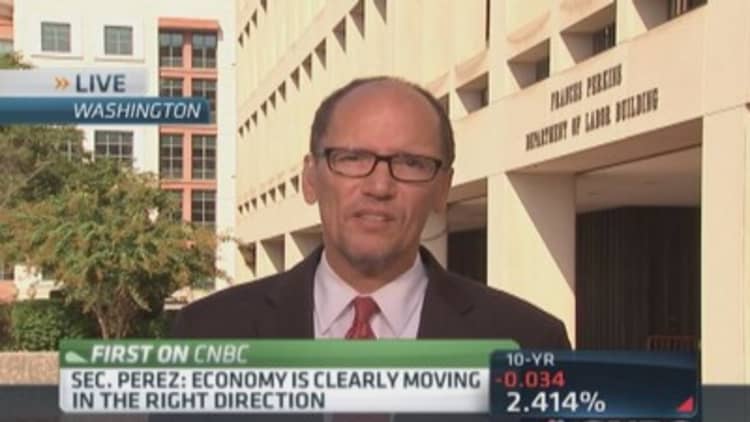Democrats and the White House got a relatively weak jobs number on Friday as the Labor Department reported a gain of just 142,000, well off the three-month trend of 236,000.
But there is reason to believe the figure will get revised higher. August jobs numbers, skewed by auto industry retooling and other seasonal factors, have been revised up by an average of 77,000 over the last five years, according to High Frequency Economics. That means the August number may have been closer to 220,000, almost exactly the consensus expectation.
Read MoreDon't believe weak August jobs data: Economists
And Democrats struggling to hang onto the U.S. Senate can take heart in other much stronger economic data suggesting the August jobs number was an anomaly. Data on manufacturing and service sector growth, unemployment claims and private sector payrolls all suggest the economy is picking up significant steam heading into the fall.
"[T]he clear message from the other data is that the trend in overall growth has moved up from what has been a 2-to-2.5 percent average for most of the recovery," HFE's Jim O'Sullivan wrote in a research note. "[T]he combined ISM data look strong enough now to be consistent with a 5 percent trend."
Other analysts suggested the August number was probably an outlier.
"This is impossible to square with all the leading payroll indicators," Pantheon's Ian Shepherdson wrote in a client note. "So we are very much inclined not to take it seriously."
Read MoreActually,this jobs report holds water, says pro
Democrats should very much hope that the numbers tick back up in September because they remain in serious danger of losing the Senate.
A new poll out on Friday showed GOP Rep. Tom Cotton leading incumbent Democrat Mark Pryor 49 percent to 47 percent in the Arkansas Senate race. That is well within the poll's margin of error, making it a statistical dead heat. But anytime an incumbent is below 50 percent at this point they are in very serious trouble.
The latest numbers from Louisiana show another vulnerable Democratic incumbent, Sen. Mary Landrieu, below the 50 percent threshold and in danger of losing to GOP Rep. Bill Cassidy. GOP State Rep. Thom Tillis is also running neck and neck with Democratic incumbent Kay Hagan in North Carolina.
Read MoreNC debate reveals how party battles will be fought
Republicans need a net gain of six seats to gain control and are all but assured pickups in Montana, South Dakota and West Virginia. They need to win just three of the remaining seven toss-up races in Democratically held seats in Arkansas, Louisiana, Alaska, Colorado, Iowa, Michigan and North Carolina to get narrow control. And the party's discipline in nominating mainstream candidates unlikely to suffer the kind of Todd Akin-style meltdowns that characterized 2012 is clearly paying off.
Democrats have a chance at picking up an open seat in Georgia. And they retain at least some hope of knocking off Senate Minority Leader Mitch McConnell in Kentucky. But the more likely scenario is the GOP hanging on to all its current seats and adding at least six more.

Kansas has also emerged as something of a wild card. Democratic nominee Chad Taylor dropped out of the race (though his name will remain on the ballot.) And independent candidate Greg Orman is now polling close to incumbent GOP Sen. Pat Roberts who has had all kinds of problems with reports that he no longer maintains a real residence in the state and has a very weak campaign operation.
A Roberts loss could complicate GOP efforts to control the Senate. Orman has steadfastly refused to say whether he would caucus with Republicans or Democrats. His choice could wind up deciding the balance of power, should he win.
Despite all this, an improving economy remains Democrats' best hope of holding the Senate. And better jobs reports in September and October would certainly help the cause.
Read MoreWhat to expect, or NOT, when Congress returns
There is every reason to believe they will get those reports and no big GOP wave will develop. That already appears to be the case in House races, where Republicans are favored to pick up only a handful of seats, below the usual gain for the sixth year election of an incumbent president's second term.
Administration officials on Friday implored people to ignore August and hope for better later in the year. "The economy is clearly moving in the right direction," Labor Secretary Thomas Perez told CNBC. "This is less than the recent trends but I've always looked at trend data, you never look at one month."
—By Ben White. White is Politico's chief economic correspondent and a CNBC contributor. He also authors the daily tip sheet Politico Morning Money [politico.com/morningmoney]. Follow him on Twitter @morningmoneyben.


